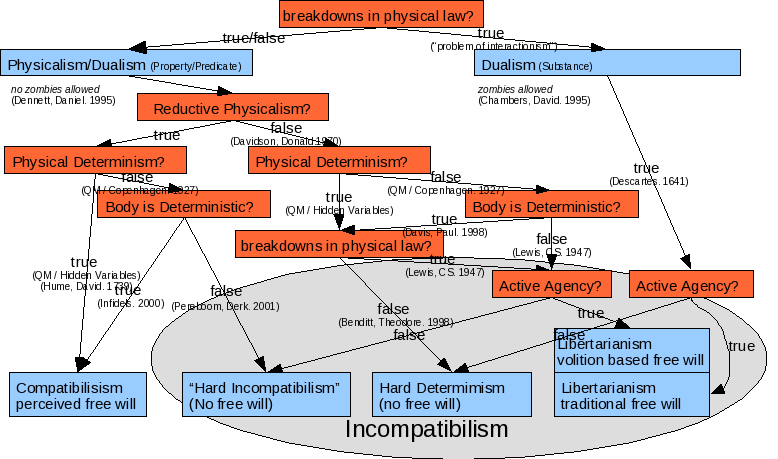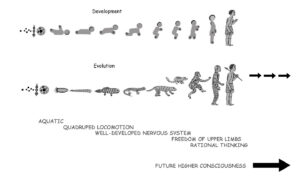Edouard Tahmizian, who is a member of the Board of Directors of Internet Infidels, interviewed me yesterday on the book that I’m currently working on: An A to Z of Unanswered Objections to Christianity. The interview, which is now available on Freethinker Podcast, can be viewed here. Enjoy!
The Skeptics Wink and Nod.
Here is an informative little video by a guy named Steve Mould who does a lot of “science” videos on youtube. Its all (ostensibly) about how simple little processes can make “meaningful” structures from stochastic processes-and he uses magnetic shaped little parts to show this. Its a popular channeled followed by millions, and is often referenced by other famous people in the science community-and his fans love it.
And hey, it does show how meaningful structures CAN form from random processes. Right? So you can learn from this. Wink, wink. Nod, nod. And all the skeptics will know exactly what he is really saying. Cause we are all part of the clique that knows this language-the language of the skeptic propagandist. I mean, he almost hides it, the real message, it is just under the surface, and the less skeptically aware, the casualist, might even miss it. The casualist might not learn as much about Steve Mould and what he is trying to say here-but the skeptic knows. “See, atheism is true! Spread the word!” Steve has given the wink. The same wink used by DeGrasse Tyson, and Sean Carroll, Lawrence Krauss, Brian Greene, and on and on. You know the one.
“Fearfully and Wonderfully Made”: Pro-life feminist Dr. Kristin Collier on pre-natal development
Until about five years ago, Dr. Collier was ardently pro-choice – and an anti-theist. Hear her conversion story here:
Billionaire Bunkers
As nobody else is starting any threads at the moment maybe the video below will stimulate some discussion here. I like a good rant and Russel Brand is as good at ranting as anybody is made clear form his YouTube channel
If you had the cash to spare would you build yourself a bunker as seen in the video?
The Goethean method as a complement to conventional science
Modern science is in danger of fragmentation and of becoming a study of artificial abstractions which become increasingly severed from reality.
As translated from Maurice Merleau-Ponty in L’Œil et l’Esprit
“Science manipulates things and gives up living in them. It makes its own limited models of things; operating upon these indices or variables to effect whatever transformations are permitted by their definition, it comes face to face with the real world only at rare intervals. Science is and always will be that admirably active, ingenious, and bold way of thinking whose fundamental bias is to treat everything as though it were an object-in-general – as though it meant nothing to us and yet was predestined for our own use.”
Introducing the Goethean method brings back the connection between the investigator and the subject under investigation.
This review by Bo Dahlin investigates science education in relation to a phenomenological approach. Continue reading
Window dressing, or: Is the God of Thomistic classical theism as dumb as a rock?
 [Courtesy of Unsplash.com & Kitti Incédi] |
 [Courtesy of U.S. Geological Survey] |
Dr. Gaven Kerr is a lecturer in philosophy at St Patrick’s College, Maynooth, Ireland. In a recent online interview with writer and philosopher Pat Flynn on a Youtube video titled, “Philosophy Friday: Classical Theism and Divine Simplicity” (March 23, 2021), Dr. Kerr (who is a Thomist and a stalwart defender of classical theism) made nine incredible metaphysical claims (two about agents in general, and seven about God), as well as six philosophically controversial background assumptions. Below, I shall argue that when taken together, these claims and assumptions add up to a picture of a God Who is literally as dumb as a rock. Basically, He’s a black box. The exalted language which Thomists use to describe God is mere window dressing, obscuring the fact that the God they worship never even thinks about the creatures He has made: they depend on Him, but on the Thomistic view, God creates them without having to think any thoughts about them, like “Let there be light” or “Let us make man in our own image.” All God ever thinks about is Himself, and even His act of “thinking about” Himself consists in nothing more than His being Himself. In other words, God knows Himself (and His creatures) simply by existing. In this post, I shall argue that the Thomistic account of knowledge is downright nonsensical, that Thomists’ reasons for denying that God has any thoughts and feelings about us are based on faulty assumptions, and finally, that if their account of God were correct, it would be irrational of us to love God or to feel grateful to Him for anything. Taken to its logical extreme, Thomistic classical theism makes the hearts of believers grow cold, and it is a lucky thing indeed that most Christians (Catholics included) are blissfully ignorant of what it teaches about God.
For those readers who are interested, here is Pat Flynn’s interview with Dr. Kerr:
The Inevitability of Life and Consciousness
Kantian Naturalist brought up the subjects of autopoesis and organizational closure whereby biological systems maintain a distinctive form while being thermodynamically open. Not only do they achieve a low entropy state but they maintain it over time.
From Wikipedia:
Autopoietic systems are “structurally coupled” with their medium, embedded in a dynamic of changes that can be recalled as sensory-motor coupling. This continuous dynamic is considered as a rudimentary form of knowledge or cognition and can be observed throughout life-forms.
This is not yet the inner conscious awareness possessed by higher animals but it is a step in that direction. Continue reading
Behe Tangles with Two Philosophers
On the Origin of the Covid Pandemic
https://gop-foreignaffairs.house.gov/wp-content/uploads/2021/08/ORIGINS-OF-COVID-19-REPORT.pdf
This is too long for a meaningful excerpt. The origin of the report, and its motivation, are political, but it’s pretty detailed.
Have at it.
Tenth Anniversary for The Skeptical Zone
Who’d have thought it would make it this far?
27th July, 2011, was the date of the very first opening post at The Skeptical Zone. The site was created by Dr Elizabeth Liddle, partly to facilitate extended discussion that got buried at the “Intelligent-Design” promoting site, Uncommon Descent, where Lizzie was an active critic for some time before falling prey to the Barry Arrington ban-hammer. It was also an experiment in attempting to facilitate discussion across widely-differing viewpoints by proposing a code of conduct involving assuming all other participants are commenting in good faith. There have been ups and downs over the years with perhaps the most disappointing aspect that Lizzie herself has ceased to be involved (except she still pays the bills).
So it is something of a miracle that the site is still active albeit well down from its peak around the end of 2015. Anyway, here we still are, some of us. I wonder what the next decade will bring.
Common Trends in Evolution
Does evolution repeat itself? Could evolution repeat itself? Where do people stand in relation to the thoughts of Gould and Conway Morris?
Gould has a point, everything is in a state of becoming. As Heraclitus would say, all is change. Replay the tape and nothing would be the same. But would or could there be any similar trends? Would life in general proceed in such a radically different way that Gould makes out?
From “Life’s Grandeur”, Gould states:
“…no persuasive or predictable thrust toward progress permeates the history of life…
“Wind the tape of life to the origin of multicellular animals in the Cambrian explosion, let the tape play again from this identical starting point, and the replay will populate the earth (and generate a right tail of life) with a radically different set of creatures. The chance that this alternative set will contain anything remotely like a human being must be effectively nil, while the probability of any kind of creature endowed with self-consciousness must also be extremely small.”
Conway Morris disagrees with Gould’s conclusion. He champions an inevitable path and cites convergent evolution as evidence which suggests this.
In “The Crucible of Creation” he states,
“What we are interested in is not the origin, destiny, or fate of a particular lineage, but the likelihood of the emergence of a particular property, say consciousness. Here the reality of convergence suggests that the tape of life, to use Gould’s metaphor, can run as many times as we like and in principle intelligence will surely emerge.”
I’m interested in what people have to say about this and its relation to topics such as the emergence of bilateral symmetry and differentiation from head to tail, extreme specialization, encephalization, endothermy, caring for young, transitions from aquatic to terrestrial living and other related topics. These processes have occurred multiple times in different lineages over time.
Open Thread: Contributions Invited!
And warmly encouraged…
This site is a little quiet these days. I know it is the middle of the Summer holiday season and the impact of Covid has been devastating to normal life. But I wonder why the site is still receiving around 100 unique visits a day when seemingly fewer of those visitors are adding opening posts or leaving comments.
If anyone has thoughts about what would encourage more participation, exchange of ideas, please let’s hear from you.
Le Tour 2021
Can Mark Cavendish win?
Tomorrow, 10th July, the 14th stage of the cycle race, Tour de France, sets off from the city of Carcassonne, exploring the foothills of the Pyrenees and circling back to the town of Quillan, making which would be at a more leisurely pace, an excellent way to experience the sights (and sites) of the Aude department, named for the Aude river which flows through Quillan and Carcassonne on its way from the Pyrenees to the Mediterranean Sea.
Continue readingSomething fun for a change…Ant on a rubber band.
Does someone with an open mind want to try to tackle this? Its about a theoretical ant on a rubber string. If the ant is crawling on the string, but the string is expanding, can the ant ever reach the end. In the video they claim it can, because the ant’s progress gets stretched towards the end, at the same time the string is stretched. But this is a bizarre interpretation in my opinion. This is only true if the string is being stretched in only one direction, that is, the direction that it is approaching. So the string is secured at one end, and streched at the other end, so indeed it keeps getting closer to the end.
But if neither end is secured, and it is stretched, there is no reason for the ant to be stretched in the direction of its progress, thus it would never go anywhere. But neither the narrator, nor anyone in the comments seems to have a problem with this. Why?
And is this in any way analagous to spacetime stretching?
An A-Z of Unanswered Objections to Christianity: W. The Sacraments
The vast majority of Christians agree that Baptism and the Eucharist are sacraments instituted by Jesus Christ, in which God’s grace is bestowed on those who receive them with the right disposition. In this essay I shall argue that notwithstanding believers’ protestations to the contrary, the standard Christian understanding of these sacraments is a magical one. In addition, Christian accounts of how the sacraments impart grace are, as far as I can tell, nonsensical: they explain nothing. Finally, the metaphysical schemes used by various Christian denominations to explain the Real Presence of Christ in the Eucharist all turn out to be philosophically incoherent.
God as Author and the Problem of Evil: A Response to Feser

Abstract
In a recent article, Edward Feser argues that the logical problem of evil rests on a category mistake regarding the nature of God and of his relationship to the world, and that a proper understanding of God’s nature and how he is related to the cosmos enables us to resolve this problem. To help his readers achieve a correct understanding of the Creator and his relation to creatures, Feser proposes an analogy between God and the author of a novel: God is “the necessary precondition of there being any natural order at all, just as an author is the necessary precondition of there being any novel at all.” I maintain that there are several fundamental flaws in the “author” analogy which render it useless as a tool for eliminating the logical problem of evil, whatever its other merits may be.
———————————————————————————————-
Continue reading
Are we on rails?
De gustibus non est disputandum
I’m not a philosopher but a couple of issues that have occupied philosophers over perhaps millenia remain unresolved. Let’s call the concepts free will and determinism. Of course a problem that arises immediately as there seem not to be consensus definitions of either concept. They also seem to be linked (in the opinion of many) in that agreeing or disagreeing with one of these concepts entails acceptance or rejection of the other. A frequently encountered strategy is to add an adjective. So we have libertarian free will, strict determinism and so on. Below is a diagram that attempts to summarize the various proposals.

Evolution Reflected in Development
Below is an image of the developmental path from human conception to adult in comparison with evolutionary path from prokaryote to human.

Unlike Haeckel’s biogenetic law with its focus on physical forms, the comparison above also concerns activity, lifestyle and behaviour. Comparative stages may be vastly different in detail, but the similarity of general lifestyles and consecutive stages are there to be observed. Continue reading
Self-Assembling Wires
Emergence in action. Enjoy.
The Fridge-o-matic Challenge
I once offered nonlin.org the ‘fridge-o-matic’ challenge. The idea was to give me a number from 1 to 9 (a shelf in my fridge/freezer), and a lateral location Left, Middle or Right, and a depth locator Front, Middle, Back. That gives 81 sectors. I go to the named sector and fumble for the nearest organism (he’d have to trust me not to cheat). If it’s a stew or pizza I’d need more info. Then I’d need a chromosome number in that organism, and a gene number on the chromosome. We could shortcut the back’n’forth by giving numbers 1-50 and 1-10,000 which I’d then normalise to the actual counts.
